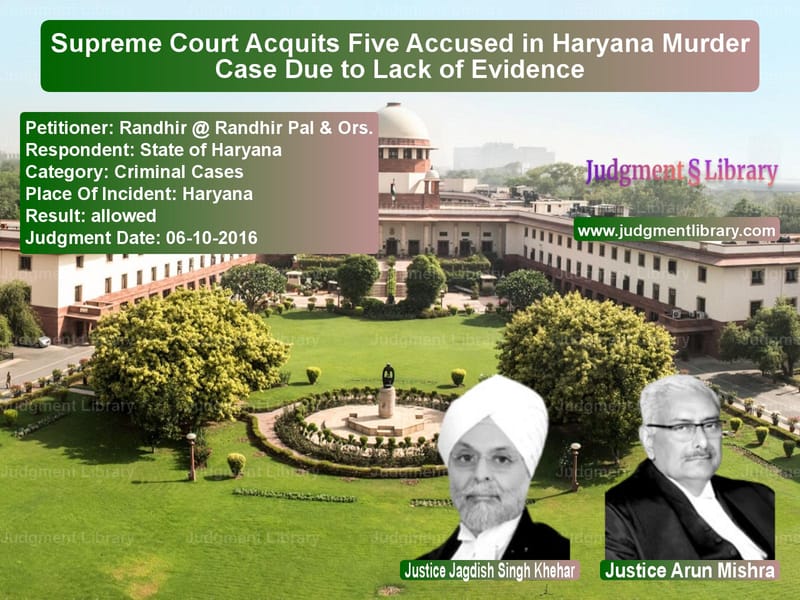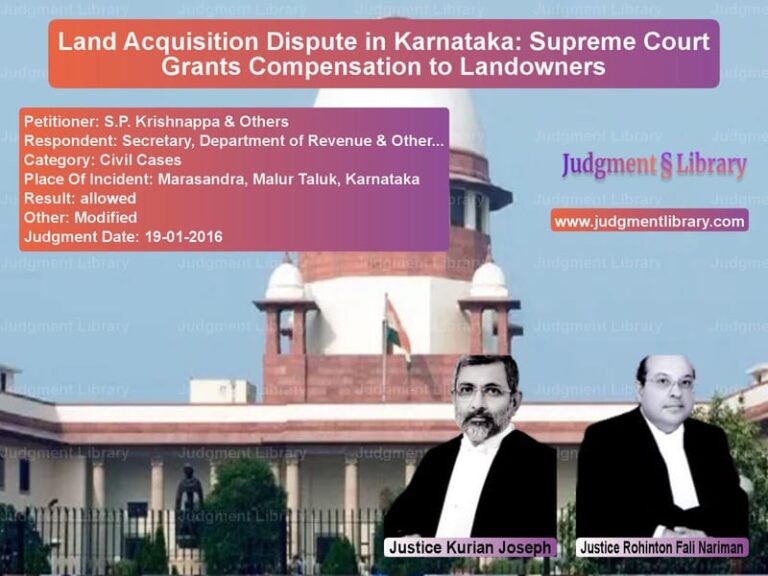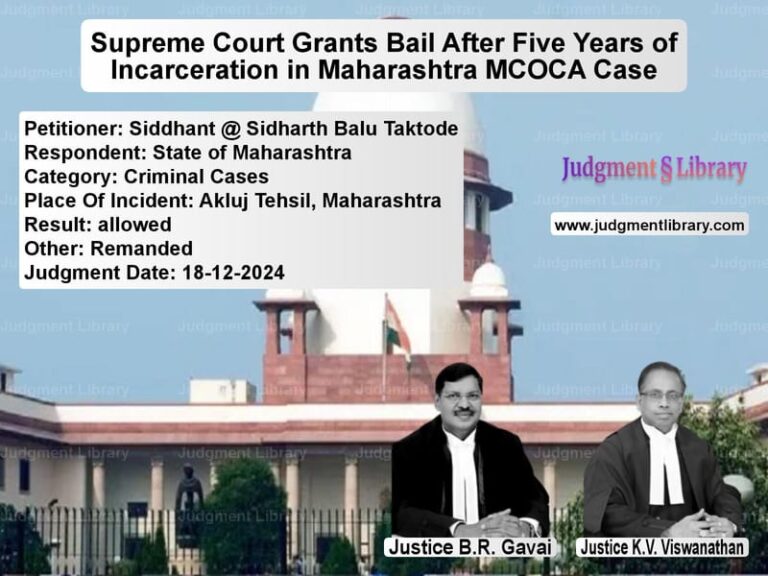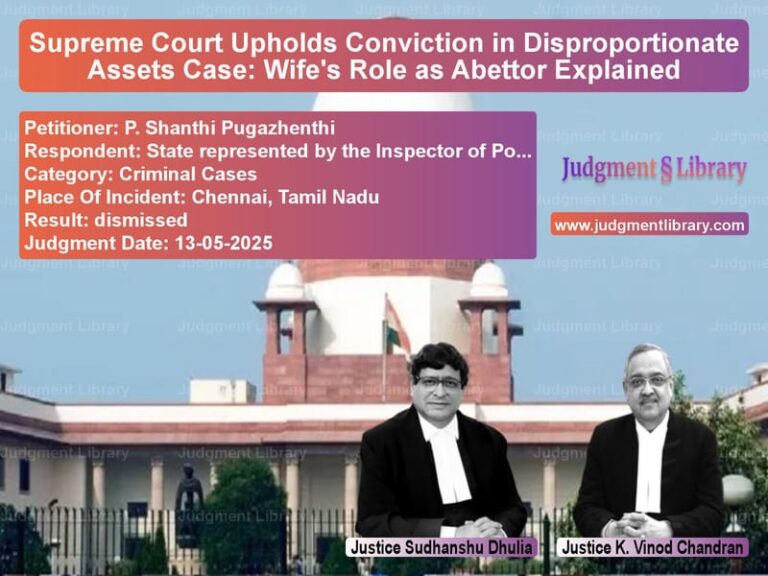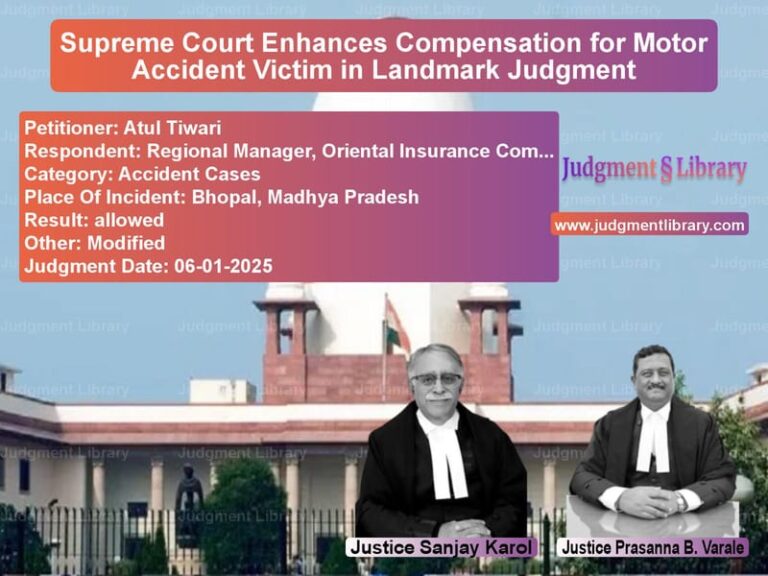Supreme Court Acquits Five Accused in Haryana Murder Case Due to Lack of Evidence
The case of Randhir @ Randhir Pal & Ors. vs. State of Haryana is a crucial ruling in criminal jurisprudence that underscores the importance of proving guilt beyond a reasonable doubt. The Supreme Court acquitted five appellants in a 2002 Haryana murder case, citing a lack of direct involvement in the crime and inconsistencies in witness testimonies.
Background of the Case
The case stemmed from a fatal attack on Laxman on November 26, 2002. The prosecution alleged that a group of eleven individuals, armed with weapons, attacked Laxman at his shop. The incident was reportedly triggered by an earlier murder of Prem, the son of one of the accused.
Initially, the trial court convicted all accused under Sections 148, 302, 342, 452, and 149 of the Indian Penal Code (IPC). Five of them—Randhir (A2), Vijay Kumar (A4), Lakhmi Ram (A7), Shiv Narain (A8), and Manoj (A11)—were accused of standing outside the shop and preventing people from interfering with the crime. The High Court of Punjab and Haryana upheld their conviction.
The appellants challenged the ruling in the Supreme Court, arguing that they had no direct involvement in the murder.
Legal Issues Raised
- Whether the accused standing outside the shop had actively participated in the crime.
- Whether there was sufficient evidence to prove that the appellants prevented others from intervening.
- Whether mere presence at the crime scene was enough to uphold a conviction under the IPC.
Arguments by the Parties
Arguments by the Appellants
- The appellants were not inside the shop where the attack occurred.
- They were falsely implicated due to family enmity following a previous murder.
- No direct evidence proved they prevented people from entering the shop.
- Prosecution witnesses had added new facts that were not included in the initial FIR.
Arguments by the Respondents (State of Haryana)
- Eyewitnesses confirmed that the appellants were stationed outside the shop, preventing others from helping Laxman.
- They were part of a larger group that planned and executed the attack.
- Their presence at the crime scene indicated common intent.
- Their conviction under Sections 148 and 149 IPC was justified due to their association with the attackers.
Supreme Court’s Observations
The Supreme Court analyzed the witness testimonies and found significant inconsistencies:
- The FIR did not mention that the accused were armed or had actively prevented people from intervening.
- Witnesses later introduced new details about the accused blocking the entrance, which raised doubts about their credibility.
- There was no physical evidence or independent testimony to confirm the accused’s role in preventing others from assisting the victim.
- The prosecution failed to prove beyond a reasonable doubt that the accused shared the common intent to kill Laxman.
Final Judgment
The Supreme Court ruled in favor of the appellants and issued the following directives:
- The appellants were acquitted of all charges due to a lack of conclusive evidence.
- Since the appellants were on bail, their bail bonds were discharged.
- The conviction under Sections 148 and 149 IPC was overturned.
Analysis of the Judgment
Reinforcing the Principle of ‘Beyond Reasonable Doubt’
The judgment upholds the fundamental principle that an accused cannot be convicted unless their guilt is established beyond reasonable doubt. The Supreme Court’s decision highlights that mere presence at a crime scene is insufficient for conviction.
Protection Against False Implication
The ruling also safeguards individuals from being falsely implicated due to personal or familial enmity. The Court noted that the accused were relatives of a previous murder victim, making it plausible that they were framed.
Strict Interpretation of Common Intention
By overturning the conviction under Sections 148 and 149 IPC, the Supreme Court reaffirmed that common intent must be proven with clear evidence. Mere association with the perpetrators does not automatically establish guilt.
Implications of the Judgment
For Criminal Law
- Reaffirms that courts must critically evaluate witness statements and FIR inconsistencies.
- Sets a precedent for acquittal when prosecution fails to provide direct evidence.
For Law Enforcement
- Police must ensure FIRs are detailed and consistent with later witness statements.
- Investigations must focus on corroborating witness accounts with physical evidence.
For Defendants in Similar Cases
- Defendants can challenge convictions based on weak circumstantial evidence.
- Legal precedents emphasize the need for concrete proof of active participation in crimes.
Conclusion
The Supreme Court’s decision in Randhir @ Randhir Pal & Ors. vs. State of Haryana reinforces the core principle of criminal law: no one can be convicted based on suspicion or association alone. By acquitting the accused due to insufficient evidence, the Court has set a strong precedent for future criminal trials, ensuring that justice is served only when guilt is proven beyond a reasonable doubt.
Don’t miss out on the full details! Download the complete judgment in PDF format below and gain valuable insights instantly!
Download Judgment: Randhir @ Randhir Pa vs State of Haryana Supreme Court of India Judgment Dated 06-10-2016.pdf
Direct Downlaod Judgment: Direct downlaod this Judgment
See all petitions in Murder Cases
See all petitions in Bail and Anticipatory Bail
See all petitions in Attempt to Murder Cases
See all petitions in Judgment by Jagdish Singh Khehar
See all petitions in Judgment by Arun Mishra
See all petitions in allowed
See all petitions in supreme court of India judgments October 2016
See all petitions in 2016 judgments
See all posts in Criminal Cases Category
See all allowed petitions in Criminal Cases Category
See all Dismissed petitions in Criminal Cases Category
See all partially allowed petitions in Criminal Cases Category

